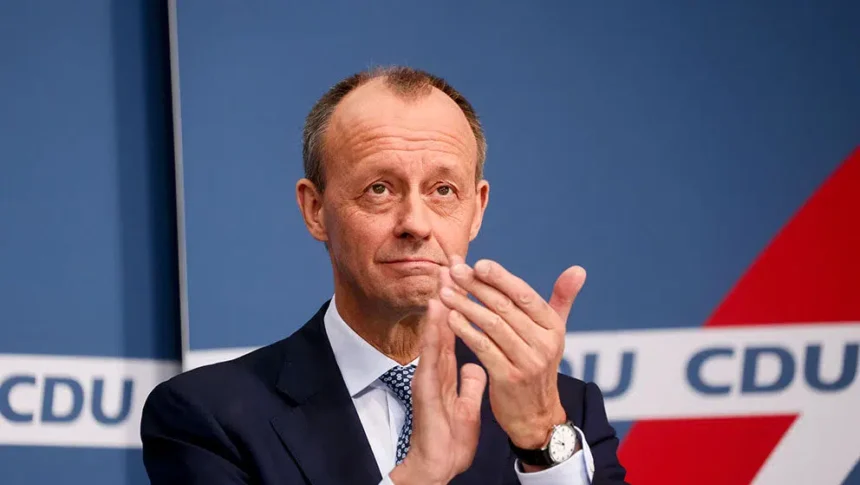German Chancellor Friedrich Merz met with top executives from German and American corporate giants operating in Germany today. Their shared goal: to pull Germany out of recession. Despite a tense economic climate, the atmosphere at the meeting was reportedly excellent, signaling a significant shift in investor sentiment.
A Shift in Economic Psychology
Economics is often intertwined with psychology. When companies are confident about future business prospects, they invest heavily; when the outlook is bleak, investments are curbed. The German export-oriented economy has been hit hard by a series of global disruptions, including the COVID-19 pandemic and its supply chain disruptions, the war in Ukraine, the ensuing energy crisis and inflation, and China’s economic slowdown. Consequently, Germany has been in recession, and OECD statistics show that in 2024, Germany had the lowest investment rate among all 38 member states.
“Made for Germany”: A €631 Billion Investment Initiative
This trend is set to change, according to the heads of leading companies operating in Germany. Sixty-one firms, including German powerhouses like Rheinmetall, SAP, Volkswagen, BMW, Mercedes, Airbus, and Deutsche Börse, along with American giants such as Nvidia, BlackRock, and Blackstone, have united under the initiative “Made for Germany.” The name deliberately echoes the renowned German quality seal “Made in Germany.”
Together, they plan to invest an astounding €631 billion over the next three years in manufacturing facilities, machinery, plants, and research and development in Germany.
“We want economic growth, we want to strengthen Germany’s competitiveness, we want to defend and expand our technological advantage,” stated Roland Busch, CEO of Siemens and one of the initiative’s co-founders, after the meeting of business leaders and German government officials at the Chancellery in Berlin.
Merz: “Germany Is Back”
Collectively, these 61 companies represent approximately one-third of the German economy. Christian Sewing, CEO of Deutsche Bank and the other co-founder of the initiative, expects more companies to join. Their joint objective is for Germany to once again become the “growth engine for a strong Europe.”
“Opportunities have rarely been greater than now – investors and international companies are ready to invest in our economy. They value Germany as a stable and reliable partner, especially in these unstable times,” Sewing commented.
Politicians are enthusiastic. “Germany is back, it pays to invest in Germany again,” said Chancellor Friedrich Merz (CDU) after the meeting. “We are on the cusp of one of the largest investment initiatives in decades. We are not an economy of the past, but of the present, and above all, of the future.”
Behind the Shift in Mood: New Political Course
The mood at this gathering of business and politics was clearly upbeat. “We had an excellent exchange of views,” summarized Christian Sewing.
But what explains this turnaround? Germany is still facing economic difficulties, with the threat of a third consecutive year without growth. And with the tariff policies of U.S. President Donald Trump looming, the outlook is anything but rosy.
However, the political course has demonstrably shifted. Revitalizing the economy is now the absolute priority of the new federal government. Since early May, a coalition of conservative parties (CDU/CSU) and social democrats (SPD) has been in power. Initial steps have already been taken: Germany has incurred new debt by issuing government bonds. Both parliamentary houses, the Bundestag and Bundesrat, have approved a special fund of €500 billion for additional state investments in infrastructure and climate protection. This includes investments in renovating dilapidated roads, energy networks, digitalization, and research.
Industrial electricity prices will be lowered, and businesses will receive significant tax relief. Initially, investments in production facilities, machinery, plants, and research and development will be largely recognized for tax purposes. In the medium term, a permanent reduction in corporate income tax is also planned.
These are precisely the measures that businesses had unsuccessfully sought from the previous government, a coalition of SPD, Greens, and the liberal FDP. Now, the government is led by Friedrich Merz, a lawyer who spent years in the private sector. From 2016 to 2020, he served as chairman of the supervisory board of the German branch of the American investor BlackRock, the world’s largest asset manager.
New Rapprochement Between Politics and Business
“Today, we started a new form of cooperation,” said Siemens CEO Roland Busch. “The conversation showed that politics and business are moving in the same direction.” Deutsche Bank CEO Christian Sewing added: “I think we have a government here that is truly stepping on the gas. The most important things – growth and competitiveness – are at the top of the agenda.”
To ensure that companies genuinely invest the announced billions, business leaders believe that politics should reduce regulation and grant companies more freedom. The business sector is particularly calling for reforms concerning bureaucracy and social contributions, which significantly increase labor costs. Employers and employees in Germany equally bear the costs for mandatory health, pension, and unemployment insurance. Health insurance contributions were significantly increased at the beginning of the year, and another increase is already announced for 2026.
The Challenge of Pensions
A staggering 42% of Germany’s GDP – its total economic output – already goes into social funds, with pension funds representing the largest burden. Germany is an aging country, and for the state to continue financing pensions, it must allocate increasing amounts from its budget year after year.
The OECD considers the reform of the social security system to be the greatest challenge for Germany’s economic future. If no changes are made, the state will increasingly have to borrow to sustain its social system. Chancellor Friedrich Merz has announced that social system reform will be the next item on the coalition’s political agenda. Initial results are expected in the autumn.







